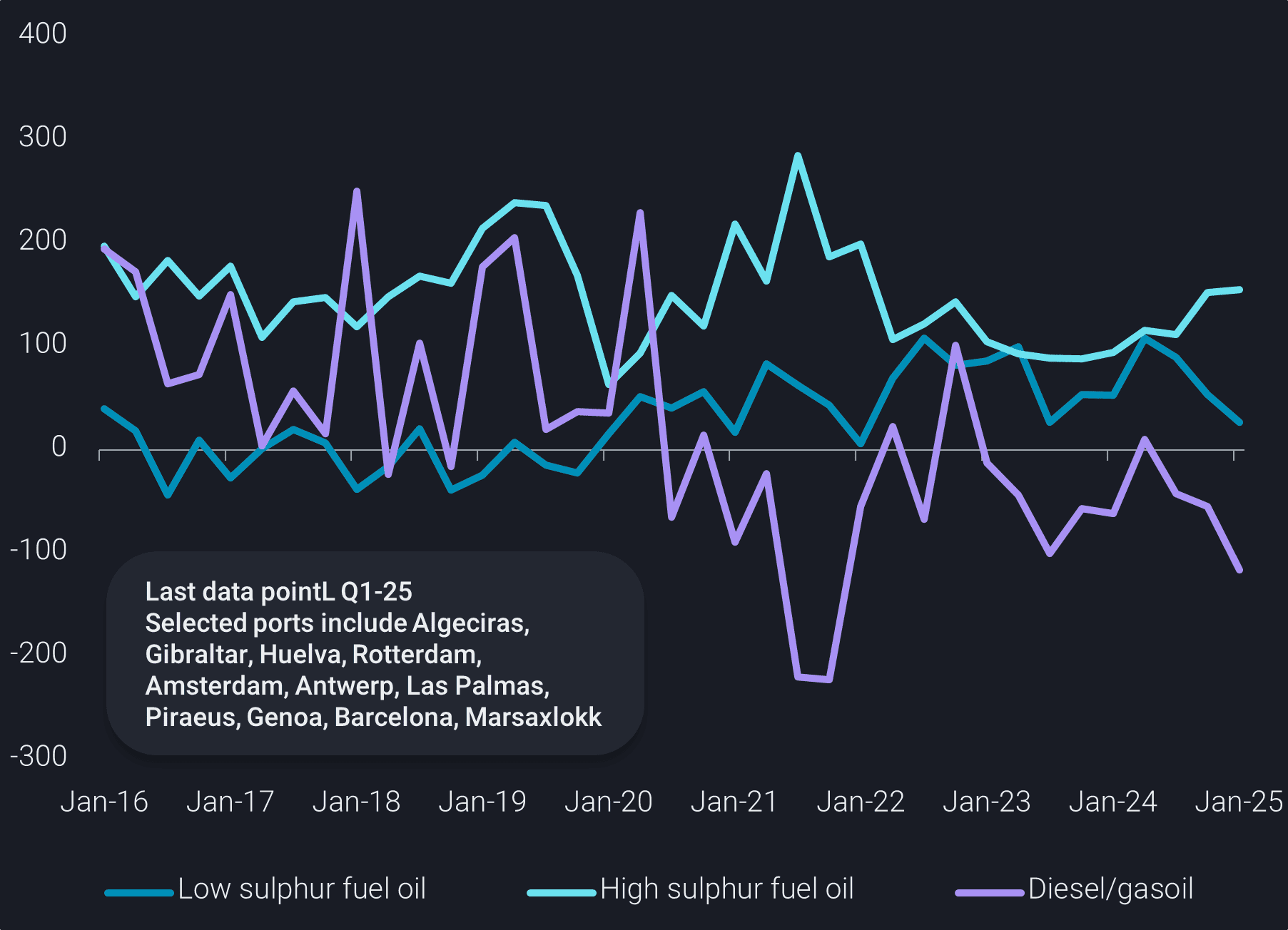New bunker regulations in the Mediterranean Sea disrupt traditional VLSFO usage
Structural changes in bunker demand are set to kick in with the International Maritime Organization (IMO) designating the Mediterranean Sea as an Emission Control Area (ECA) in May 2025. However, the impact of this change could be limited by lacklustre Suez Canal transits and a potential slowdown in global trade.
From May, the Mediterranean Sea is becoming the fifth Emission Control Area (ECA) globally, following the Baltic, North Sea, North America and the US Caribbean Sea. New requirements for bunker usage in the area will disrupt fuel oil demand in the region as the new limit for sulphur content in bunkers is falling from 0.5% to 0.1%. (read our previous blog)
Since the start of the year, the new bunker requirements have led to a slowdown in low-sulphur fuel oil imports at key bunkering ports in the Mediterranean and Northwest Europe as demand for very low sulphur fuel oil (VLSFO) used in bunkers will fall. Conversely, high sulphur fuel oil (HSFO) imports remain resilient as scrubber-equipped vessels continue to use HSFO.

Quarterly low sulphur fuel oil, high sulphur fuel oil and diesel/gasoil net imports at selected ports in Mediterranean and Northwest Europe (kbd)
Fuel oil and diesel/gasoil could see a structural shift in flows
Since February, the disparity between import demand for VLSFO and HSFO oil in the Mediterranean has narrowed the VLSFO-HSFO spread (Argus Media) in Algeciras and Gibraltar. If VLSFO demand remains weak and arbitrage economics are favourable, there could be opportunities to move VLSFO cargoes to the East of Suez markets. Due to availability and compliance, shipowners will likely switch to low sulphur marine gasoil (LSMGO) as bunkers for non-scrubber equipped vessels. In addition, biofuel grades such as B24/B30 are another option if the shipowner is subject to FuelEU requirements.
An alternative to using LSMGO as bunkers is ultra low sulphur fuel oil (ULSFO), as ULSFO prices would range between LSMGO and VLSFO. However, the demand for ULSFO bunkers has not caught up over the past few years because of the lack of production. Heavy-sweet crude supplies (under 0.2% sulphur) with high yields of ULSFO have been constrained. A major contributor to this is Dar Blend crude liftings struggling, with only one loading seen over the past thirteen months. ULSFO production will likely remain low because of limited supplies of these heavy-sweet barrels.
Other factors limiting LSMGO bunker demand in the Mediterranean
One factor limiting LSMGO bunker demand in the Mediterranean is the reduction in voyages passing through the Suez Canal, falling by 65% year-over-year in 2024. This trend continued in 2025, albeit with a slight increase in March. Shipowners prefer rerouting their vessels via the Cape of Good Hope instead of using the Suez Canal due to higher war risk premiums and insurance costs, leading to higher tonne-mile demand for such deliveries. Due to the rerouting of vessels, some vessels completely avoid the Mediterranean Sea, limiting bunker demand in the region.
The incremental demand for LSMGO will likely be spread out across neighbouring regions as vessels could replenish their bunker supply before heading into the Mediterranean Sea. Overall, the bunker composition may see marginal shifts in demand, but there wouldn’t be a significant impact on the oil market, though VLSFO demand could suffer.
So far, Vortexa import demand indicators show oil demand is slowing down, as transportation fuel arrivals in key consumption locations have fallen for the second consecutive month in February and March (Download our Energy and Insights forum report). In addition, President Trump’s policies may lead to a deterioration of global trade and economic contraction. While a slowdown in the global economy could lead to a reduction in global bunker demand due to fewer goods being traded between countries, any reduction in bunker demand will likely be spread globally.

